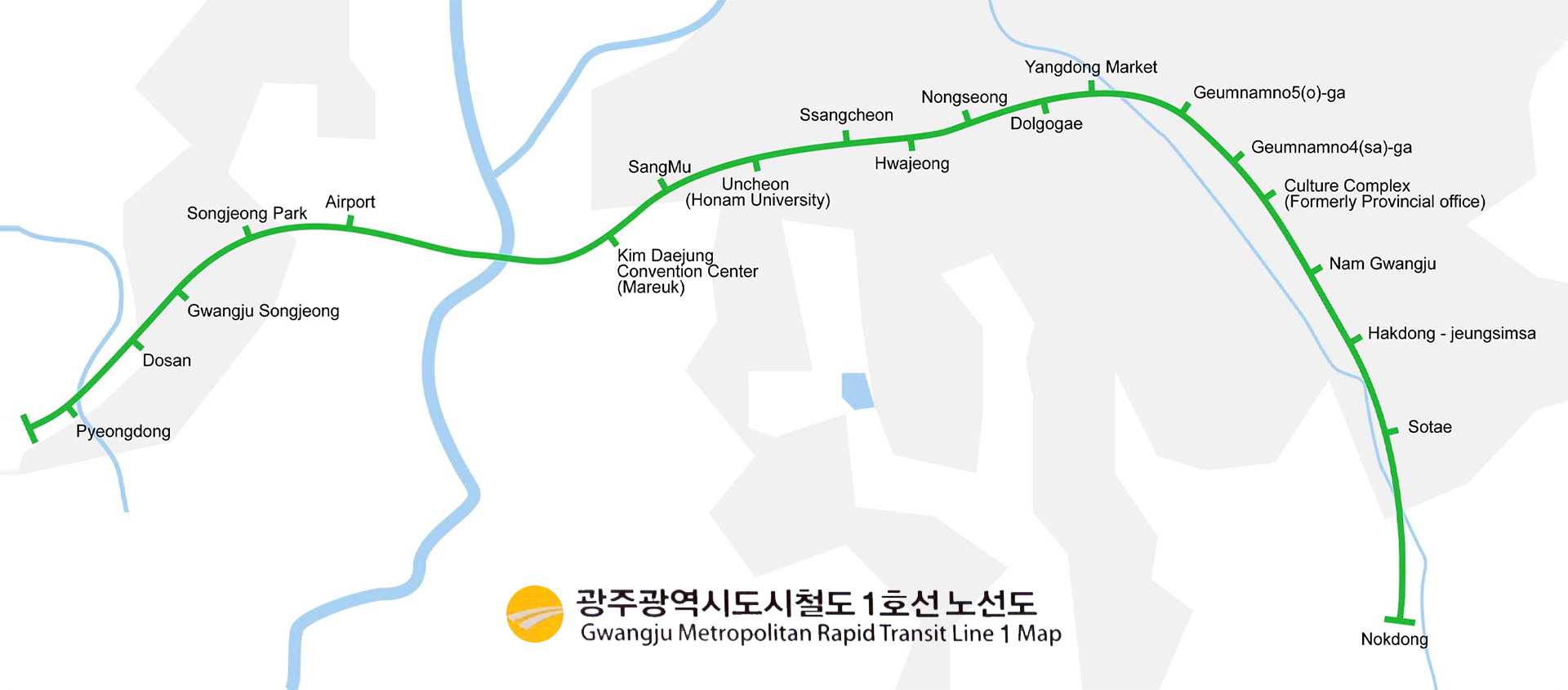Gwangju Metro Information
A rapid transit system in the city of Gwangju, South Korea, the inauguration of the Gwangju Metro put the city on the world map as the fifth South Korean city to have its own metro system. It began operation in 2004 and currently connects the eastern and western ends of Gwangju through the central business district and the city’s airport. The 20.1km network currently operates on a single line, serving a total of 20 stations. Under the management of the Gwangju Metropolitan Rapid Transit Corporation, expansion plans are already underway. A new line is planned, along with the further extension of Line 1.
The Gwangju Metro, also known as the Subway, is an integral part of the city’s transport system and carries around 46,600 passengers daily. It doesn’t operate 24 hours a day, with operating hours from 5:30 to 00:00.
The metro has no air conditioning and it’s not allowed to walk between platforms. All trains on this line are manned; there are no driverless trains. However, there are screen doors on the platforms for added safety.
The Gwangju Metro is operated by the Gwangju Metropolitan Rapid Transit Corporation. The fare is 1 (currency not specified in the original data).
Gwangju Metro Map
Map of Gwangju Metro showing different lines. Click on the map to enlarge it or download the Gwangju Metro map in PDF format.
Operating Hours
The subway in Gwangju runs from 05:30 am to midnight. On average, trains arrive every 8 to 10 minutes. However, during the morning rush hour, you can expect a train every 5 minutes, and during the evening rush hour, trains arrive about every 7 minutes.
Lines and Stations
Line 1 runs from the eastern to the western corner of the city. Starting from Pyeongdong, it passes major points such as Gwangju Airport, the Culture Complex, Sangmu business district, downtown near Geumnammo-4 and 5, and finally terminates at Nokdong. The terminal stations at both ends are above ground, while the rest of the line is underground. The section between Nokdong and Sotae operates as a shuttle line, with trains arriving every 30 to 60 minutes.
The journey from one end of the line to the other takes about 37 minutes. For those who need to travel further, transfers to the KTX and KoRail are available at Gwangju Songjeong station. A bus line also operates near Nongseong station.
Notable stations on this line include:
- Nokdong
- Sotae
- Culture Complex
- Geumnamno 4(sa)-ga
- Geumnamno 5(o)-ga
- Yangdong Market
- Nongseong
- Uncheon
- Sangmu
- Kim Daejung Convention Center
- Airport
- Songjeong Park
- Gwangju Songjeong Station
- Pyeongdong
Expansion
The Gwangju Metropolitan Government is planning to extend Line 1. It is planned to extend the line south to Hwasun and north to Naju. These extensions are now part of the ‘5+2’ comprehensive economic zone project and are a high priority.
Line 2 was originally conceived as a ring line, but the city government is now considering transforming it into a north-south line. If built as a ring line, it will be a 27.4km line connecting stations such as:
- Baekyoon-gwangjang
- Namgwangju Station
- Gwangju Station
- Gwangju Bus Terminal
- Market
- Sangmu
- Baegun-gwangjang
- Hyocheon Station
However, if it becomes a north-south line, it will cover a 24.58 km route connecting stations such as:
- Hyocheon Station
- Baekyoon-gwangjang
- Namgwangju Station
- Chosun University
- Gwangju Station
- Chonnam National University
- Ilgongno
- Bonchon-industrial Park
- Cheomdan Area
Gwangju residents will ultimately make the final decision. There are also plans for Line 3, though official information on this is still pending.
Fares and Tickets
The Metro charges a flat rate for all journeys, regardless of the distance travelled. However, there are two alternative ticketing options, each with a different cost. You can either buy a Transport Card or a Single Journey Ticket.
A single journey ticket costs 1200 won for an adult (19-64 years), 1000 won for a teenager (13-18 years) and 400 won for a child (6-12 years). If you use a Traffic Card, the prices for adults and teenagers are reduced to 1100 won and 800 won respectively. The price for children remains the same. Persons over the age of 65, infants (0-5 years), disabled persons and veterans can travel for free upon presentation of appropriate identification and proof of age.
Reduced fares or free travel on city buses and other public transport are available under certain conditions with the Traffic Card. Discounts are also available for groups of 20 or more.
Tickets can be purchased from ticket machines at stations. Pre-paid Traffic Cards are available at metro station centres and convenience stores.
